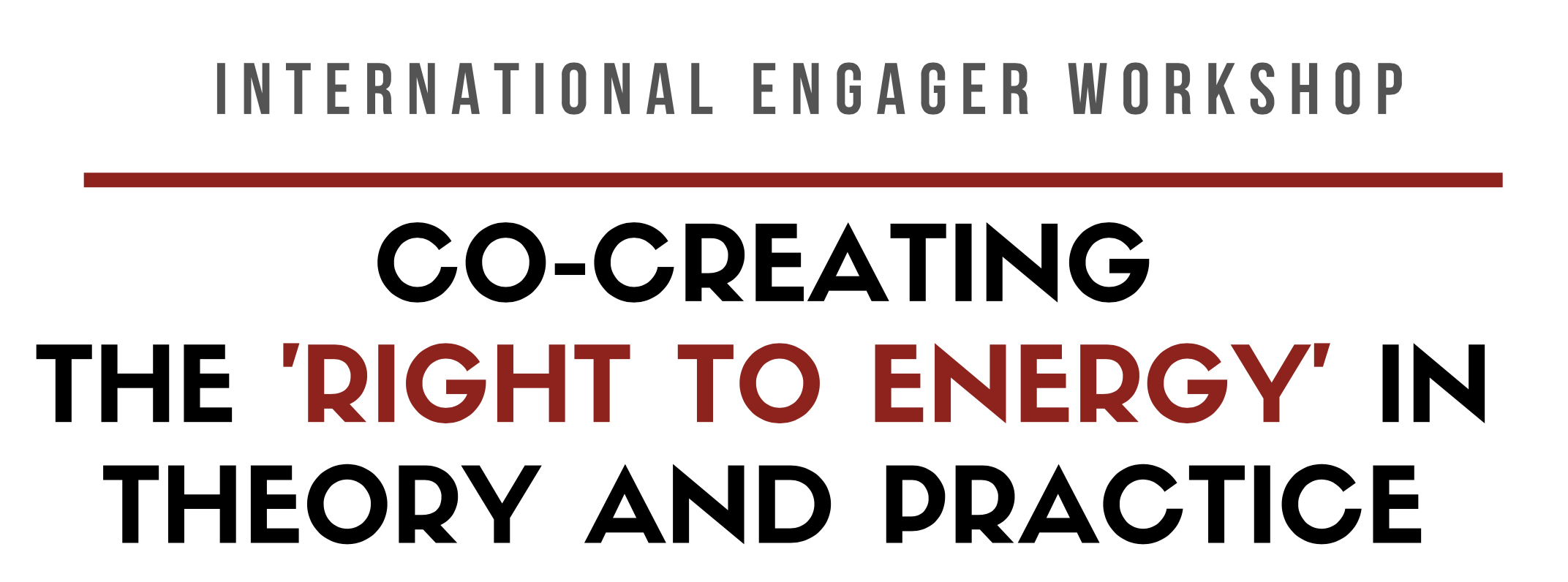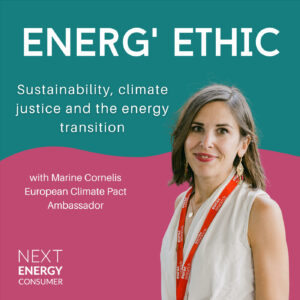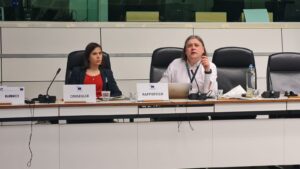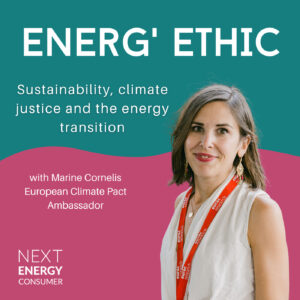This report highlights some key points of the presentations delivered on the first day and outcomes of the workshop on enforcement of energy rights I organised on behalf of the ESRC Just Energy team.
The Right to Energy Workshop (Groningen, 8-9 January 2020) was organised by the EU ENGAGER COST Action European Energy Poverty: Agenda Co-Creation and Knowledge Innovation (2017-2021). The Right to Energy is a way of framing energy poverty for better, fairer and cleaner energy access. Underlying issues are presented in the Policy Brief ‘The Right to Energy in the EU’, published in June 2019.
Participants from all around the world underlined that the notions of a ‘right to energy’ and ‘energy justice’ go far beyond energy poverty mitigation. ‘Energy’ means a lot of different things, depending on the person and on the situation. Advocating for universal a right to ‘energy’ may not be the right path, but calling for a right to energy services, such as a comfortable home, light, mobility and safe energy supply could be a way forward (Gordon Walker, Lancaster University).
An ‘energy right’, as a conceptual framework, relies on ‘fundamental’ and ‘supplemental’ energy rights. Fundamental energy rights are the right to access energy, use related services, efficient products and management technologies, and also access information, and of course, afford energy expenses. ‘Supplemental’ energy rights imply the right to participate in energy policymaking, to select the type of energy supplier and the sources of power, and also the right to accept or refuse the payment of certain services (Chian-Woei Shyu, National Chung-Cheng University, Taiwan).
Currently, as underlined in the Seventh Sustainable Development Goal (SDG7), the right to energy supposes having an available supply, infrastructure and a provisioning system. But this is not enough to guarantee that persons do get electricity when they need, are warm enough, use efficient appliances or can afford the payment of their bills. Therefore, we could certainly add the right to have applicable laws, policies and regulation correctly enforced, such as the right to lodge a complaint and “simple, fair, transparent, independent, effective and efficient out-of-court mechanisms for the settlement of disputes (…) through an independent mechanism such as an energy ombudsman or a consumer body, or a regulatory authority” or an Alternative Dispute Resolution entity (article 26 of the Electricity Market Design Directive – (EU) 2019/944).
Not addressing the Right to energy increases vulnerability
The right to energy is intertwined to the respect of the person and their Human Right to dignity. Power disconnection affects deeply one’s feelings: their self-respect, their capacity to self-determination and their public recognition. Even in Western Europe, some public services or administrations are wary of those who cannot provide for themselves (Katrin Großmann, University of Erfurt), and this fosters mistrust of institutions, companies or bank services. The sense of guilt can be significant: many people adapt their lifestyle to cope with their difficulties but believe they must keep appearances and do not seek help.
Many citizens lack awareness of their energy rights and what they can to do in case they are facing a problem. Unethical commercial practices and misinformation on the available tariffs and support schemes are widespread (e.g. eligibility for the social bonus in the case of Spain). Certain persons may even be reluctant to claim their benefits because they do not trust the system and believe they will have to pay for later. Some fear bureaucracy and the perceived high costs of redress. Consumer dispute resolution is, in the majority of EU country, completely free. Legal help at no fee may be available under conditions, but there the fear of losing the case and having to pay extra legal expenses prevents certain people from acting. Many women believe that justice is for men, not for them, and in practice, they may not even have their name on the supply contract. Judges may also not be equipped to understand the challenges at stakes.
The very concept of energy is a challenge for many — understanding how energy supply and networks works and therefore, its importance and its impact is not straightforward. There are gaps between the energy consumption reduction objectives and access to information on how to make a difference. Despite specific provisions on energy efficiency in EU law, average citizens do not know the solutions and opportunities to moderate their demand. Understanding the energy bill is often so hard that people cannot figure out the amount they should be paying, or if they have arrears. Sometimes experts from social services have trouble detecting debts and situations of vulnerability.
Tailored information provided by trusted institutions such as (local) governments should be more widely available. Media should be more active in promoting energy efficiency information and public awareness. Focusing on the negative aspects reinforces adverse feelings within the public, which then may face help offered with hostility.
Perceived humiliation and unfairness coming from service deprivation and not addressing energy poverty opens the gap for populist ideas to take over (Katrin Großmann, University of Erfurt). In certain countries, such as Mexico, some people are criminalized for being energy-poor and fighting for their rights to a safe supply (Umberto Cao, Centre Norbert Elias). The right to energy is closely linked to governance and democracy, as well as climate transition and broader justice objectives.
[youtube https://www.youtube.com/watch?v=XwMx6tRYFfY&w=560&h=315]
Energy justice opens the door to a broader concept looking at costs, benefits, procedures, and recognition at a worldwide level. Energy justice is very linked to animal and environment conservation. The more we fight energy poverty through decarbonisation strategies, the more certain vulnerable groups will be at risk because of the difficulty to access natural resources. There is a fundamental energy injustice coming from the decarbonisation of our societies. For instance, in Ghana and the Democratic Republic of the Congo, the race for raw material leads to health and safety issues for the miners. Therefore, “pure energy justice may not be possible; it may pragmatically be picking your poison or choosing winners” (Benjamin Sovacool, University of Sussex).
Find here my tweets of the days





